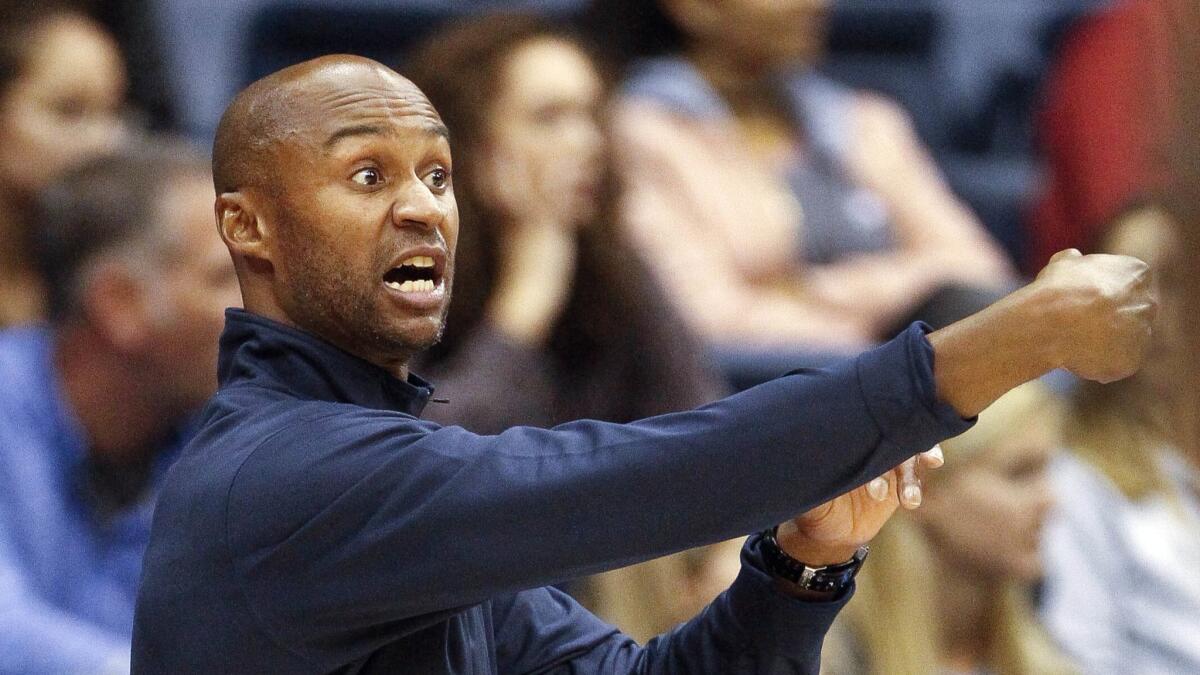Former University of San Diego basketball coach in college scandal is identified

- Share via
Reporting from San Diego — When allegations of a massive college admissions corruption scandal broke last week, court documents left out one important detail: the identity of the coach at the University of San Diego accused of accepting bribes.
Speculation ended Wednesday with the identification of Lamont Smith, the head coach of the Toreros men’s basketball team for nearly three seasons from 2015-18. He had resigned in the wake of a domestic violence arrest following a game in Oakland last year.
Smith, 43, was hired as assistant basketball coach at the University of Texas-El Paso last spring, but the school announced Wednesday evening that he had resigned “effectively immediately.”
Smith did not return calls for comment.
On Thursday, Smith’s attorney, Charles Clayman, said in a statement: “Although the allegations against Mr. Smith are not relevant to his role at the school, he felt it would be in the best interest of the students, faculty and staff to take this action. Lamont is deeply grateful for the opportunity to work with the talented athletes and coaching staff at the University of Texas at El Paso and wishes his players continued success in their studies and careers.”
The news is one more piece of an elaborate puzzle that involves elite schools across the country and a network of wealthy families, athletic departments and the college admissions industry.
Smith has not been charged in connection with the scandal. It is not clear why he was not identified by name in the two charging documents that largely define the case, or if charges are pending.
In a letter to the university, USD President James T. Harris III said USD had been subject to a confidentiality order that prohibited it from disclosing the former coach’s identity.
“Earlier today, the government informed us that the order has been modified and that USD will not be viewed as interfering with the investigation if we choose to identify him,” the letter states.
The FBI investigation has focused on a Newport Beach company run by William “Rick” Singer, identified as the mastermind of the scheme to get the children of wealthy parents into various universities by bribing coaches to accept them as student athlete recruits, even though the students didn’t plan to play on the teams.
Singer called it the “side door” into selective schools, since coaches typically have sway to recruit a certain number of athletes, and admission standards are typically lowered for such students. His firm, known as The Key, allegedly helped doctor applications to make prospective students appear to be athletes in that particular sport when they weren’t, as well as raised standardized test scores by having someone else take the exam or a proctor provide correct answers.
Several coaches at other universities linked to the scheme have been indicted by a federal grand jury in Boston — where the case is being prosecuted — including women’s soccer coaches at USC, a men’s soccer coach at UCLA and a tennis coach at Georgetown University.
Thirty-two parents have also been charged by criminal complaint, including Hollywood actresses Felicity Huffman and Lori Loughlin.
Smith allegedly helped admit the son and daughter of Robert Flaxman, a Beverly Hills resident who is president of Crown Realty and Development in Los Angeles. The children are not named in the complaint.
The Key used Martin Fox, a Houston tennis academy operator, as an intermediary to make the deals, according to a criminal complaint against Flaxman and other parents.
Fox is also an influential figure in grassroots basketball. He is general manager of the Nike-sponsored Houston Hoops club that has produced dozens of college players, several of whom are in the NBA. His since-deleted Twitter account shows him photographed with many of college basketball’s biggest coaching names.
In October 2015, Singer sent Flaxman’s son’s ACT scores and school transcripts to Fox, who then forwarded the materials to the unidentified USD coach, according to the complaint. Singer followed up with the father a day later, confirming that he “spoke to USD” and they received the information. “They are interested in helping,” Singer wrote in the email.
About a week later, Flaxman asked for a status update, and Singer replied: “The coach I am working with has not gotten his scheduled appointment with Admissions for all of his recruitable athletes. He is on board to help and has [your son’s] materials. I am sure I will receive a call on next steps soon.”
That approval came 10 days later, when a USD admissions counselor emailed the coach and said Flaxman’s son could be recruited to the team.
When it came time for the son to submit his application, The Key helped shape the boy’s athletic profile, according to the complaint. Singer sent Flaxman and his son an email in November 2015 with the subject line: “Here is what I came up with that touches on a lot of who you are and what I put on your application.”
The application and essay that was submitted to USD highlighted volunteer work as the manager of an elite youth athletic team — activity that had not been in previous drafts, according to the complaint.
The son was formally admitted in March 2016, and Flaxman subsequently wired $250,000 to The Key’s charitable foundation in two installments, according to the complaint.
About the same time, the foundation issued a $100,000 payment to Fox, who later advised he had paid the coach for helping admit the boy, the complaint states.
The complaint does not specify if the coach was paid the entire amount or a portion.
The boy, who is a current student, did not play on the team.
In the fall of 2016, Flaxman is accused of using the same network to get his daughter admitted into USD — this time as a recruit to the same team as a manager, according to the court records.
But first, she had to get a better score on her ACT. The complaint alleges that Singer paid a Florida private school official to help out with the answers while he administered the test in Houston.
The test scheme cost Flaxman $75,000, according to the complaint.
Flaxman posted $250,000 bail following his arrest in Los Angeles. He is expected to report to court in Boston next week. His attorney declined to comment.
The daughter decided not to attend USD after all. Still, “Singer paid the USD coach $10,000 for his help in securing her admission,” the indictment states.
Smith was a student at USD himself.
He played at USD in the late 1990s and was team captain his last two seasons. He bounced around as an assistant coach for the next 16 years — Saint Louis, Saint Mary’s, Santa Clara, Arizona State, Washington, New Mexico — before USD hired him to replace Bill Grier in April 2015.
The Toreros went 9-21 in his first season, then improved to 13-18 and 18-13.
But late last season, after a game at the University of San Francisco, he was placed on administrative leave after being arrested at Oakland International Airport on suspicion of domestic violence, assault with force likely to commit great bodily injury and false imprisonment stemming from an incident at the team hotel. The district attorney ultimately opted against pressing charges two weeks later, but Smith resigned as coach.
“This was Lamont’s decision,” USD Athletic Director Bill McGillis said at the time. “I can’t speak for him on how he came to this decision, but he determined that it was the right decision and he offered his resignation and we accepted it.”
USD President Harris said in his letter Wednesday that the government has not identified anyone else at the university connected to the scandal.
“We continue to have no reason to believe that any other employees, students or applicants were involved in or aware of any wrongdoing,” Harris said.
The university’s Board of Trustees has appointed a special committee to oversee the school’s response, as well as hired an outside law firm to conduct an investigation.
This is the latest scandal involving the USD men’s basketball program, its highest profile sport since it does not play scholarship football.
In 2013, guard Brandon Johnson, then the school’s all-time scoring leader, pleaded guilty and was sentenced to six months in federal prison for his part in a point-shaving ring during the 2009-10 season. Former USD assistant coach T.J. Brown, the alleged go-between with the bettors, was sentenced to a year.
Zeigler and Davis write for the San Diego Union-Tribune.
More to Read
Sign up for Essential California
The most important California stories and recommendations in your inbox every morning.
You may occasionally receive promotional content from the Los Angeles Times.












